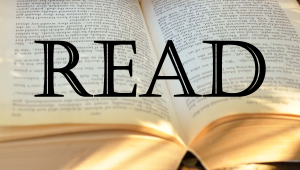1 David Foster Wallace (1962 – 2008)
Amy Berke; Robert Bleil; Jordan Cofer; and Doug Davis

Photographer Steve Rhodes
Wikimedia Commons
CC BY-SA 2.0
David Foster Wallace (1962 – 2006)
David Foster Wallace was born in Ithaca, New York, but was raised in Urbana, Illinois. The son of two academics, his father, James Donald Wallace, was a philosophy professor
at the University of Illinois, while his mother, Mary Jean Foster, was an English professor at Parkland College. During his youth, Wallace was a regionally ranked junior tennis player (an
interest that would emerge as a subject in many of his writings). Wallace attended Amherst College, where he majored in both English and Philosophy. His first novel, The Broom of the System (1987), was based on his undergraduate thesis. After his undergraduate studies, Wallace enrolled at the University of Arizona, where he earned his M.F.A. in fiction; he then enrolled in a philosophy graduate program at Harvard University before dropping out during his first semester and admitting himself into a mental institution. From this time onward, Wallace began to take a greater interest in fiction, especially postmodern fiction, reading writers such as John Barth and Donald Barthleme, who were influential on his writing.
Wallace’s debut novel, The Broom of the System, led to several influential publications, yet, it was his novel, Infinite Jest (1996), which earned him universal accolades, including landing him on the cover of Time Magazine. It also earned him the MacArthur Genius Grant (1997). Considered one of the greatest novels in the last fifty years, Infinite Jest deals with popular themes found in Wallace’s work, such as addiction and media’s growing influence in our culture.
Wallace was a rare writer, who wrote about a variety of topics, ranging from tennis, to writing the first critical study of rap, to a book on the concept of infinity. In 2004, he married painter Karen Green and, in 2008, after years of dealing with clinical depression, Wallace committed suicide. Posthumously, his estate published the novel The Pale King (2011) which was a finalist for the Pulitzer Prize. Since his suicide, Wallace has captivated the public and been the subject of countless essays and features. In 2009, Jon Krasinski adapted a film version of Wallace’s book Brief Interviews with Hideous Men. In 2015, a film based on David Lipski’s book length interview with Wallace, Although in the End You End Up Becoming
Yourself (2010), was released under the title, At the End of the Tour.
“Consider the Lobster,” originally published in Gourmet magazine, is a great example of Wallace’s mass appeal, his ability to write about a seemingly simple event, a Lobster Festival, with humor and nuance, while uncovering the complex issues that arise from the festival.
“Consider the Lobster”

“Infinite Jest”


